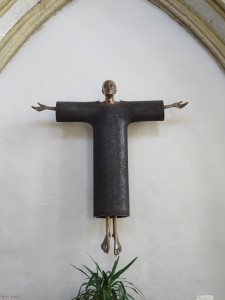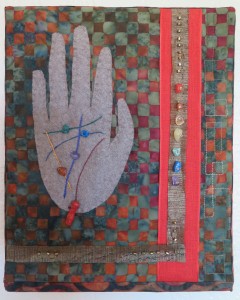 I love seeing the bumper sticker, ‘Practice Random Acts of Kindness.’ (Among other things, it beats most of the alternatives on the bumpers of pick-up trucks and SUVs here in Colorado.) I love the idea of random acts of kindness.
I love seeing the bumper sticker, ‘Practice Random Acts of Kindness.’ (Among other things, it beats most of the alternatives on the bumpers of pick-up trucks and SUVs here in Colorado.) I love the idea of random acts of kindness.
But the fact is, 99.44% of them are not random at all.
A week ago, I attended the memorial service for the mother of a beloved friend. This was a woman who practiced extravagant welcome all her life. She made quilts for shelters, cooked meals for the hungry, offered her couch and her table and her heart to homeless youth, unwed mothers, refugees, foster children, and abused women. For Gwen, kindness was not a random act, it was a discipline. It was a joy and a delight, it was an act of love, it was generous and exuberant and expansive and life-warming…all of those. What it wasn’t, was random. It was a chosen practice in easy times and hard, in rich times and poor, in happiness and in despair.
Put simply, kindness is a profoundly conscious way of being in the world.
The twelfth century Jewish scholar, scientist and astronomer, Moshe ben Maimon (known to many as Maimonides) wrote about the eight levels of tzedakah (the Hebrew mandate to live with justice, righteousness, and charity). His words apply as profoundly to the 21st century as they did to the 12th. If you are not familiar with them, I offer them here. [Speaking personally, I have learned that it doesn’t hurt to be reminded even thought I am familiar with them!] From lowest level to highest, Maimonides describes the practice of justice and love this way:
1. The person who gives reluctantly and with regret.
2. The person who gives graciously, but less than one should.
3. The person who gives what one should, but only after being asked.
4. The person who gives before being asked.
5. The person who gives without knowing to whom he or she gives, although the
recipient knows the identity of the donor.
6. The person who gives without making his or her identity known.
7. The person who gives without knowing to whom he or she gives. The recipient does
not know from whom he or she receives.
8. The person who helps another to become self-supporting by a gift or a loan or by
finding employment for the recipient.
 Over almost 30 years of ordained ministry, I have used these in more than a few sermons. I have taught them in more than a few classes. I have offered them a guides for capital campaigns and for annual stewardship drives. They are unquestionably financial and material in their explicit reference to generously sharing the resources with which we have been entrusted…and, let’s be frank here, most of us are not overly generous with our material or financial resources. All you need to do is look at the figures for charitable giving – it comes in at about 1% of annual income. Considering how Bill and Melinda Gates and Warren Buffet and Oprah (and the unnamed folks who give 10%, 15%, 25% of their income) skew that average, it suggests that the rest of us are well below 1%. One percent.
Over almost 30 years of ordained ministry, I have used these in more than a few sermons. I have taught them in more than a few classes. I have offered them a guides for capital campaigns and for annual stewardship drives. They are unquestionably financial and material in their explicit reference to generously sharing the resources with which we have been entrusted…and, let’s be frank here, most of us are not overly generous with our material or financial resources. All you need to do is look at the figures for charitable giving – it comes in at about 1% of annual income. Considering how Bill and Melinda Gates and Warren Buffet and Oprah (and the unnamed folks who give 10%, 15%, 25% of their income) skew that average, it suggests that the rest of us are well below 1%. One percent.
But Maimonides was not only referring to money. His simple schema applies to emotional, physical, spiritual, and psychological resources, as well. And, again, let’s be frank: people who are generous in any one area, people who are practicing at, say, the 5th or 6th or 7th level emotionally also tend to be generous financially. And those who are financially generous, tend to be spiritually and physically generous, too: giving ‘their’ time to be present to the lonely, shoveling snow for the elderly, tutoring children in reading skills or math, serving in soup kitchens or school classrooms, or volunteering at the library. And those who are out coaching inner city sports teams with cast-off equipment from wealthier districts, usually also can find $2 or $3 in their pockets to purchase a pair of new socks for a homeless person. Generosity and kindness are deliberately chosen practices. Until they become as automatic as breathing. (See Gwen’s story above.)
In the United States, we are currently living in the circle of Dante’s Hell that we call ‘The Election Cycle’. We are standing in a hurricane-level deluge of divisive rhetoric and if we listen with even half an ear, we are aware that the vast majority of the candidates are encouraging us to think of ourselves and only ourselves, to put our vote in the hands of our fearful inner child. An exceedingly large number of them are appealing to us to consider kindness (justice, charity, righteousness, tzedakah) as a outright luxury we cannot afford. Into this swamp of individualistic selfishness, the idea of ‘Kindness’ being accomplished by ‘Random Acts’ seems charming, and (may I be blunt?) has the distinct advantage of not asking anything of us except an occasional warm fuzzy feeling.
Well, folks, we are facing a series of complex problems and issues on both a national and global scale that need more than ‘random’ attention. They need us to practice a generosity of spirit, mind, heart, body, and psyche in relation to our neighbors, the strangers who are suffering outside our doors, and the earth. To practice. To make a choice about who we want to be and how we want to live our one, wild, wonderful life.
I am inviting you to print Maimonides principles of tzedakah and look honestly at where you are living right now, today. My beloved spouse and I do this every year – at least once, sometimes two or three times if we are feeling particularly tempted to ‘practice random acts of kindness’ as opposed to conscious acts of kindness.
I invite you to commit to moving one level higher this year as an act of rebellious witness, an act of cultural disobedience.
 I invite you to join with friends, family, unknown neighbors, the readers of this post, and the anonymous woman who set up a trust fund to give away $10 million to help the families who were wiped out in the floods in North Fork, to practice conscious acts of kindness and to demand of our political candidates and elected officials that they offer us a vision of generosity and mutual responsibility, a vision in which the whole is much greater than the sum of the parts, a vision of possibility connected to just and righteous treatment of each other.
I invite you to join with friends, family, unknown neighbors, the readers of this post, and the anonymous woman who set up a trust fund to give away $10 million to help the families who were wiped out in the floods in North Fork, to practice conscious acts of kindness and to demand of our political candidates and elected officials that they offer us a vision of generosity and mutual responsibility, a vision in which the whole is much greater than the sum of the parts, a vision of possibility connected to just and righteous treatment of each other.
We have the power to create a world of justice and kindness. Together. One person at a time. If we choose.
–Andrea
Text © 2016, Andrea La Sonde Anastos
Photos © 2015, Immram Chara, LLC
NOTE 1: You asked for my nine-fold prayers. Eight of them (for the quarter days and cross-quarter days of the Celtic Year) are now available as a hand-sewn booklet-card from my Etsy shop. There is even a special 2-For offer so that you can purchase one for a friend and one for yourself.
NOTE 2: If you haven’t seen my Facebook page (Immram Chara), please check it out. I post there almost every day. If you are willing (and haven’t already), please Like the page…and pass it along to friends. Thank you.